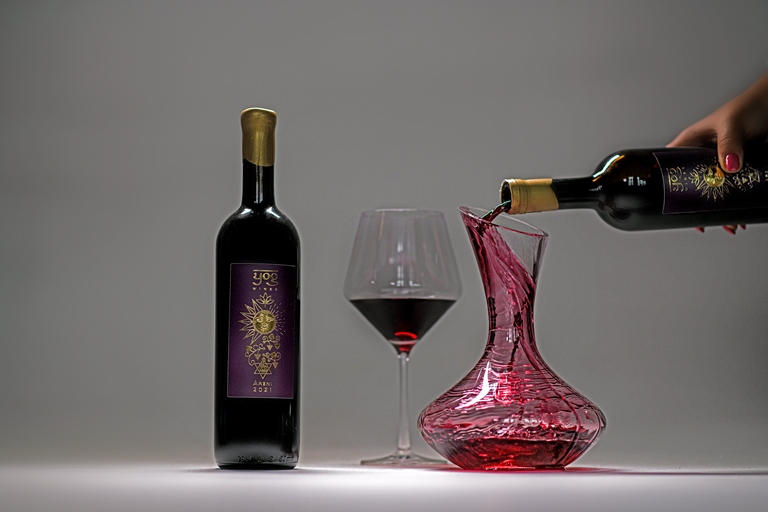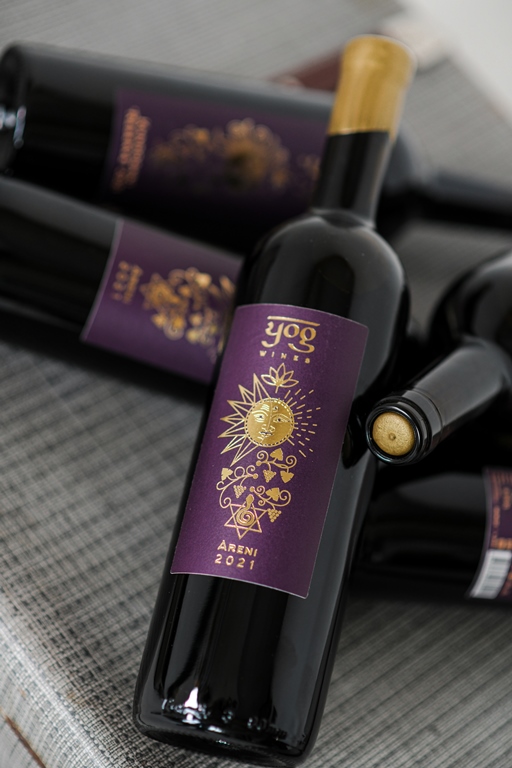Wine Story: War is not reason to give up on country - Indian Lobhana Ahale on visiting Armenia in 2020, founding her Yog Wines here

By Syune Arakelyan
War is not a reason to give up on a country. On the contrary, you should stay here and make this land more powerful, says Lobhana Ahale, the founder of Yog Wines.
The Indian recruitment professional became interested in winemaking in 2020—during the pandemic. Ahale was in Dubai when she decided that she had to explore something new, and that was the wine industry, although Lobhana confesses she had no background on wine before coming to Armenia.
"I wanted to take a break from my corporate career to study and learn something new. And I found EVN Wine academy, contacted them, I took admission with them. It was tough initially because all the chemistry was forgotten at school, and in the beginning, when our teachers would get us wine to taste, I understood that everybody’s grandparents in Armenia were making wine, so they are used to it or understand it better, and I was really shy and not sure what I’m feeling, what’s right or wrong. But during the pandemic I just decided, along with studies, to try wine and do a lot of self-study; that’s how it became of an interest," recalls Ahale.

Why Armenia?
Lobhana says she was always fascinated more by the smaller countries in Europe compared with the large ones, where people often go, so she thought of visiting Armenia—the small country full of decades of history and culture.
"When I came I fell in love with the landscape. Though I had some challenges with the language, it was not that difficult because people were warm and friendly. Even if they don’t speak English, they have the attitude and nature to help you. And my friends in the class all treated me like family. So, it became very easy for me to stay in and become a part of Armenia. Now I have a lot of friends, mainly from the wine industry."
Lobhana is in Armenia for about three years. Besides the “barrier” of the Armenian language, which she is now studying intensively, the hardest part of her journey is being far from her husband and family. But no matter what, she saw her future in Armenia, and even the war in Artsakh (Nagorno-Karabakh) started by Azerbaijan in 2020 didn't make Ahale change her mind.
"When I came, I just decided to take a break from and study something new. But while we were studying, in 2020 the war happened and during that whole time everybody was deciding what was next; maybe to go to another country and get a job in their winery’s, or stay and work here, which was not possible for me because I don’t speak Armenian or Russian, so that was the only challenge for me to find a job. Even if people wanted me, I had issues with the language. Foreign people were telling me, 'don’t invest in Armenia, we don’t know what will happen next.' But for me that was the point that I decided I want to invest in this country and give a beginning point, and we’ll see how things move in the future. I think that during the time of war the people I met somehow contributed to my decision. I believe that war is not a reason to give up on a country. I think this land deserves a lot more."
Before coming to Armenia, Ahale didn't even have any expectations because wine was a completely new thing for her. Lobhana confesses she was not even so much into it and wasn't aware of the real taste of Armenian wines.
"When I came here I started comparing European wines with Armenian ones. I think Armenia has potential and is doing really very well because there is something that is native, something new to offer to the world in terms of grapes and what they can express in different styles of wines. For example, orange wine is a trend in Armenia. A lot of producers are experimenting, some of them ending with beautiful expressions and experiments. So, the Armenian wine industry has a place in the world and a very long road to go on."

Indian touch and spirituality to Armenian wine
Yog Wines is an Indian touch to Armenian wine, but also expresses the wine maker's personality as well.
"Me as a person, I have been spiritual for almost 20-25 years, and it’s a part of me. Yog is more of a spiritual word, rather than physical yoga, and it means the union of body, mind, and spirit. I have tried to show on my label the connection of wine to it. Wine is a plant-based product, something that comes from nature and is 70 percent made of fruit, and it uses all the things from nature. Also, when people taste wines they always look for an expression, look for the wine to talk to them, tell them a story either about the wine maker, the family or the country; so, it is spiritual because you are looking for a bond."
According to Lobhana, she looks for people to celebrate themselves while drinking her wines, "We are often busy doing things for our job, for our family, relationships, and forget to thank ourselves for how far we came on—even if we had a bad day at work. When people drink Yog Wines, for me, it is important they value, they thank themselves for whatever they are."
Ahale does not have her own winery yet, but she has her own vineyards. The Areni grapes come from a small plot of vineyard in Aghavnadzor village of Armenia, and the Khndoghni grapes—from the Martakert region of Artsakh.
"I do not have a winery; I use the Maran facility in Musaler [village of Armenia]. Both my wines are limited in quantity, and Khndoghni is especially dedicated to the people of Artsakh because it was that war that made me decide to stay here; on the back of the bottle I have some content which shows that. I only make red wines and don’t have any plans of making white or rose ones because I feel like I haven’t really found what I want from these type of wines," says Ahale adding that because of their texture, her wines are not for everyone. "They are more into a heavy side, but they express myself. The reason I chose Areni is because it, as a grape, is humble and sophisticated and can adapt very well, and somehow it expresses the strong and bold personality in me. Khndoghni is also my other side. It’s again strong and bold, but has some wisdom as well."

Food and Wine
Everyone enjoys their glass of wine in different ways. Many have some strict rules of eating this or that food with the exact type of wine.
"I usually love to enjoy my wine with my books, alone; but if I’m outside, I do pair it with the usual Armenian food. I’m mostly vegetarian. I don’t eat meat, but chicken in pizzas or pastas. But there are some Armenian food that I love, like Spas, the cabbage Tolma, the beetroot salad, and the eggplant rolls," says Lobhana.
The Future in Armenia
There are some similarities between Indian and Armenian cultures, in people's attitudes, and that became for the Indian wine maker easer to settle and adapt in Armenia’s capital Yerevan. She invested here and sees her future in Armenia.
"I think Armenians do value their culture, their religion, family, and relationship with people, and that is something the same in India. Also, the two nations are food lovers—although our food is very different. Both are very hospitable and will never leave you hungry if you visit their houses. It’s something common between Indians and Armenians.

“I do see my future in Armenia. I have plans to set up a winery and grow the wine business. I have no passion now to go and explore another country. This country definitely feels like home. So, I have India as a home, I have Dubai as a home, and now Armenia as well. I studied engineering only because my parents wanted to; but when I started wine making, no matter how hard, it gives me joy. So, Armenia helped me to find that joy."
Lobhana says the hardest thing is finding herself alone when coming home at the end of the day; and being away from her husband makes it more difficult.
"My husband has never visited Armenia yet, and it’s hard to live far away. I keep traveling to Dubai to see him; it’s hard. And if somebody asks me what is the toughest part about this journey, it is whether you have a good day, or a bad day, coming home only to yourself has been a difficult part. Although I have lived alone most of my life, I think there’s a certain point, and at the end of the day you just want to see someone."
Follow NEWS.am STYLE on Facebook, Twitter and Instagram
- Tokyo public toilets become unique tourist attraction for travelers In addition to visiting temples and admiring the cherry blossoms, visitors to Tokyo can now explore the city's more modern wonders—public toilets, reports Reuters...
- Dubai named ‘No.1 global destination’ in Tripadvisor Travellers’ Choice Awards for the third consecutive year The top Tripadvisor award is the latest in a series of global accolades for Dubai...
- Dubai Welcomes the Autumn Season։ Where to go and what to do? The onset of the autumn season in Dubai is always met with eager anticipation...
- Wine Story: War is not reason to give up on country - Indian Lobhana Ahale on visiting Armenia in 2020, founding her Yog Wines here Lobhana says she was always fascinated more by the smaller countries, so she thought of visiting Armenia....
- Hospitable Armenia: Inside Yerevan's first, so far only The Alexander luxury hotel In its new project, NEWS.am STYLE tells about interesting places in the country where one can eat deliciously, relax, and get new impressions and sensations…
-
18:47, April 27
Wine story: JancisRobinson.com chief editor speaks about her wine adventure in Armenia (exclusive) -
21:16, April 26
Burj Al Arab and Atlantis, The Palm named world’s most Instagrammable hotels -
20:15, April 26
Gold pocket watch recovered from body of richest passenger on Titanic up for auction -
19:23, April 26
Montegrappa unveils pen dedicated to Frankenstein -
16:21, April 26
Miami Sex Museum opens ‘Desire Machines’ exhibition by Hajime Sorayama -
15:19, April 26
Supermodel Gisele Bündchen bursts into tears during conversation with police -
14:11, April 26
Jimmy Kimmel mocks Kanye West's plans to launch porn platform -
13:31, April 26
Ex-girlfriend Julia Fox says her affair with Kanye West left ‘sour aftertaste’ in her mouth -
12:20, April 26
Kylie Jenner not pregnant with Timothée Chalamet's child, despite social media rumors -
11:16, April 26
Salma Hayek shares throwback photos from wedding to Francois-Henri Pinault -
10:18, April 26
Kim Kardashian admits to not watching American Horror Story with her debut -
23:16, April 25
Miu Miu becomes world’s most popular brand
All materials
- Archive
























